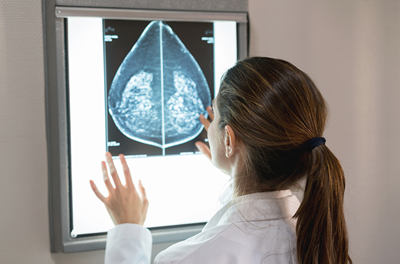Penn Researchers Predict 10-Year Breast Cancer Recurrence with MRI Scans
Using imaging to characterize the genetic makeup of tumors paves the way for individualized, non-invasive treatment.
By Lauren Ingeno

Diverse diseases like breast cancer can present challenges for clinicians, specifically on a cellular level. While one patient’s tumor may differ from another’s, the cells within the tumor of a single patient can also vary greatly. This can be problematic, considering that an examination of a tumor usually relies on a biopsy, which only captures a small sample of the cells.
According to a new study from researchers at Penn Medicine, Magnetic Resonance Imaging (MRI) and an emerging field of medicine called radiomics — which uses algorithms to extract a large amount of features from medical images — could help to characterize the heterogeneity of cancer cells within a tumor and allow for a better understanding of the causes and progression of a person’s individual disease. The findings were published in Clinical Cancer Research.
“If we’re only taking out a little piece of a tissue from one part of a tumor, that does not give the full picture of a person’s disease and of his or her response to specific therapies,” said principal investigator Despina Kontos, PhD, an associate professor of Radiology in the Perelman School of Medicine at the University of Pennsylvania. “We know that in a lot of instances, patients are over-treated, getting therapy that may not be beneficial. Or, conversely, patients who need more aggressive therapy may not end up receiving it. The method we currently have for choosing the appropriate treatment for patients with breast cancer is not perfect, so the more steps we can take toward more personalized treatment approaches, the better.”
Kontos and her colleagues wanted to determine whether they could use imaging and radiomics for more personalized tumor characterization. Using MRI, the researchers extracted 60 radiomic features, or biomarkers, from 95 women with primary invasive breast cancer. After following up with the patients 10 years later, the group found that a scan that showed high tumor heterogeneity at the time of diagnosis — meaning a high diversity of cells — could successfully predict a cancer recurrence.
“Our study shows that imaging has the potential to capture the whole tumor’s behavior without doing a procedure that is invasive or limited by sampling error,” said the study’s lead author Rhea Chitalia, a PhD candidate in the School of Engineering and Applied Science at the University of Pennsylvania. “Women who had more heterogeneous tumors tended to have a greater risk of tumor recurrence.”
Continue reading on Penn Medicine News.
